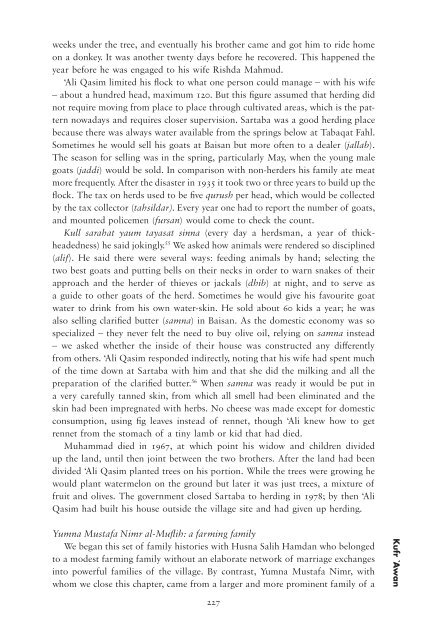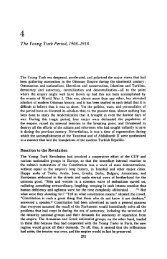Governing property, making the modern state - PSI424
Governing property, making the modern state - PSI424
Governing property, making the modern state - PSI424
Create successful ePaper yourself
Turn your PDF publications into a flip-book with our unique Google optimized e-Paper software.
weeks under <strong>the</strong> tree, and eventually his bro<strong>the</strong>r came and got him to ride home<br />
on a donkey. It was ano<strong>the</strong>r twenty days before he recovered. This happened <strong>the</strong><br />
year before he was engaged to his wife Rishda Mahmud.<br />
‘Ali Qasim limited his flock to what one person could manage – with his wife<br />
– about a hundred head, maximum 120. But this figure assumed that herding did<br />
not require moving from place to place through cultivated areas, which is <strong>the</strong> pattern<br />
nowadays and requires closer supervision. Sartaba was a good herding place<br />
because <strong>the</strong>re was always water available from <strong>the</strong> springs below at Tabaqat Fahl.<br />
Sometimes he would sell his goats at Baisan but more often to a dealer (jallab).<br />
The season for selling was in <strong>the</strong> spring, particularly May, when <strong>the</strong> young male<br />
goats (jaddi) would be sold. In comparison with non-herders his family ate meat<br />
more frequently. After <strong>the</strong> disaster in 1935 it took two or three years to build up <strong>the</strong><br />
flock. The tax on herds used to be five qurush per head, which would be collected<br />
by <strong>the</strong> tax collector (tahsildar). Every year one had to report <strong>the</strong> number of goats,<br />
and mounted policemen (fursan) would come to check <strong>the</strong> count.<br />
Kull sarahat yaum tayasat sinna (every day a herdsman, a year of thickheadedness)<br />
he said jokingly. 55 We asked how animals were rendered so disciplined<br />
(alif). He said <strong>the</strong>re were several ways: feeding animals by hand; selecting <strong>the</strong><br />
two best goats and putting bells on <strong>the</strong>ir necks in order to warn snakes of <strong>the</strong>ir<br />
approach and <strong>the</strong> herder of thieves or jackals (dhib) at night, and to serve as<br />
a guide to o<strong>the</strong>r goats of <strong>the</strong> herd. Sometimes he would give his favourite goat<br />
water to drink from his own water-skin. He sold about 60 kids a year; he was<br />
also selling clarified butter (samna) in Baisan. As <strong>the</strong> domestic economy was so<br />
specialized – <strong>the</strong>y never felt <strong>the</strong> need to buy olive oil, relying on samna instead<br />
– we asked whe<strong>the</strong>r <strong>the</strong> inside of <strong>the</strong>ir house was constructed any differently<br />
from o<strong>the</strong>rs. ‘Ali Qasim responded indirectly, noting that his wife had spent much<br />
of <strong>the</strong> time down at Sartaba with him and that she did <strong>the</strong> milking and all <strong>the</strong><br />
preparation of <strong>the</strong> clarified butter. 56 When samna was ready it would be put in<br />
a very carefully tanned skin, from which all smell had been eliminated and <strong>the</strong><br />
skin had been impregnated with herbs. No cheese was made except for domestic<br />
consumption, using fig leaves instead of rennet, though ‘Ali knew how to get<br />
rennet from <strong>the</strong> stomach of a tiny lamb or kid that had died.<br />
Muhammad died in 1967, at which point his widow and children divided<br />
up <strong>the</strong> land, until <strong>the</strong>n joint between <strong>the</strong> two bro<strong>the</strong>rs. After <strong>the</strong> land had been<br />
divided ‘Ali Qasim planted trees on his portion. While <strong>the</strong> trees were growing he<br />
would plant watermelon on <strong>the</strong> ground but later it was just trees, a mixture of<br />
fruit and olives. The government closed Sartaba to herding in 1978; by <strong>the</strong>n ‘Ali<br />
Qasim had built his house outside <strong>the</strong> village site and had given up herding.<br />
Yumna Mustafa Nimr al-Muflih: a farming family<br />
We began this set of family histories with Husna Salih Hamdan who belonged<br />
to a modest farming family without an elaborate network of marriage exchanges<br />
into powerful families of <strong>the</strong> village. By contrast, Yumna Mustafa Nimr, with<br />
whom we close this chapter, came from a larger and more prominent family of a<br />
227<br />
Kufr `Awan












